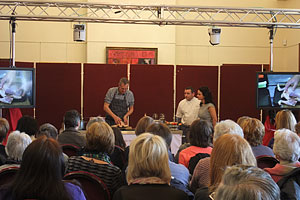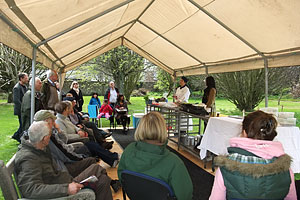Engaging with Food
Published on 1 October 2013 in Food, health and wellbeing
Engaging with a public (community) audience is recognised by the Scottish, UK and EU Governments as an important responsibility of the research community, especially given the rapid rate of advancement in biomedical and agri-food research and the global challenges we face, such as food security and climate change. The Rowett Institute of Nutrition and Health, University of Aberdeen, has been using food as a topic for engagement for many years and has developed, in partnership with others, several formats and strategies for successful and effective engagement.

Key Challenges
Much of the research that is undertaken in Scotland and the UK is funded by the Government and therefore ultimately comes out of tax-payers’ purses. We need to ensure that communities have the opportunity to find out about the research that is funded, and discuss and debate the outcomes and value of this work to society. If this engagement doesn’t exist, then it is frequently the media who will fill the knowledge gap, with varying degrees of impartiality and use of evidence.
Public engagement is a ‘catch-all’ term which can be used to describe a great many different types of events from illustrated lectures, interactive workshops and exhibitions to intensive consultations. We have developed a number of event formats that work well to engage a community audience with a food-related topic, and some of these actually involved the serving and consumption of food as well.
Examples include:
‘Chef-scientist’ demonstrations: A well-known Chef develops a cookery demonstration in collaboration with a nutrition scientist. As the Chef prepares the meal, the nutrition scientist comments on the provenance and nutritional value of the meal. These events were first developed as part of the Scottish-Government funded ‘Science on a Plate’ project, and have subsequently been delivered at the Royal Highland Show and the University of Aberdeen’s May Festival as well as local community events such as ‘The Huntly Hairst’ (as part of Scottish Food and Drink Fortnight).
Discussion dinners: A meal is prepared according to a given set of criteria e.g. healthy and sustainable, locally-sourced produce. The diners discuss and debate the issues raised by the meal itself such as local versus global food production, food for health, land use etc. The use of hand-held voting sets during an introductory scene-setting presentation can help to frame some of the issues and promote subsequent discussion. Most diners find this interactive voting very engaging, and it also works well with younger audiences.
Pop-up tea rooms: In collaboration with a socially-engaged artist, we have developed a more intimate event, where a tea-room format facilitates conversation in small groups around topical issues. Various art forms (such as decorating plates) are used to record and share outcomes from conversations.
Interactive workshops/discussion forums: During the British Science Festival in Aberdeen 2012, an interactive workshop was run on the topic of ‘Food Addiction: Fact or Fiction’. Presentations, discussion, and interactive demonstrations were successfully brought together to explore this controversial topic. Uniquely, the story of the event has been published in ‘Obesity Facts’ 2013;6:103–108. Food security is another topic that has been extensively debated by panels of experts from Scotland’s research institutes and Universities, with events taking place in Aberdeen, Edinburgh, and Dundee.
Key Benefits
The ability of the planet to provide enough food for all the people who live on it, and the inequalities that exist between those who are starving and those who are obese, are major challenges that we face today. Underneath the big picture are many other issues specifically of interest to Scotland and the UK, such as the health problems associated with overweight and obesity and the need for the sustainable economic development of the agri-food industry.
Community engagement with science events such as those described above can help with an appreciation of these issues, both in terms of the value of research and also what changes to their own lifestyle an individual might consider making.
Engagement events can help researchers as well as lay members of the communuity consider questions such as:
- How can we eat a healthy diet?
- How can we eat a healthy diet that is also sustainable and environmentally-friendly?
- What has food security got to do with me?
- What affects the food I choose to buy and eat?
Events are usually evaluated with questionnaires and/or semi-structured interviews. The process and the outcomes (new knowledge, changed perspectives) are assessed.


Comments or Questions
Related Websites
Our Partners
Many of the events described above have been undertaken with partners such as The Royal Botanic Garden, Edinburgh; The Moredun Research Institute, The James Hutton Research Institute and SRUC, as well as colleagues from the University of Aberdeen.
Find Out More
For more information please contact Dr Sue Bird or Laura Young via the details below.Authors
Dr Sue Bird sue.bird@abdn.ac.uk
Laura Young laura.young@abdn.ac.uk







